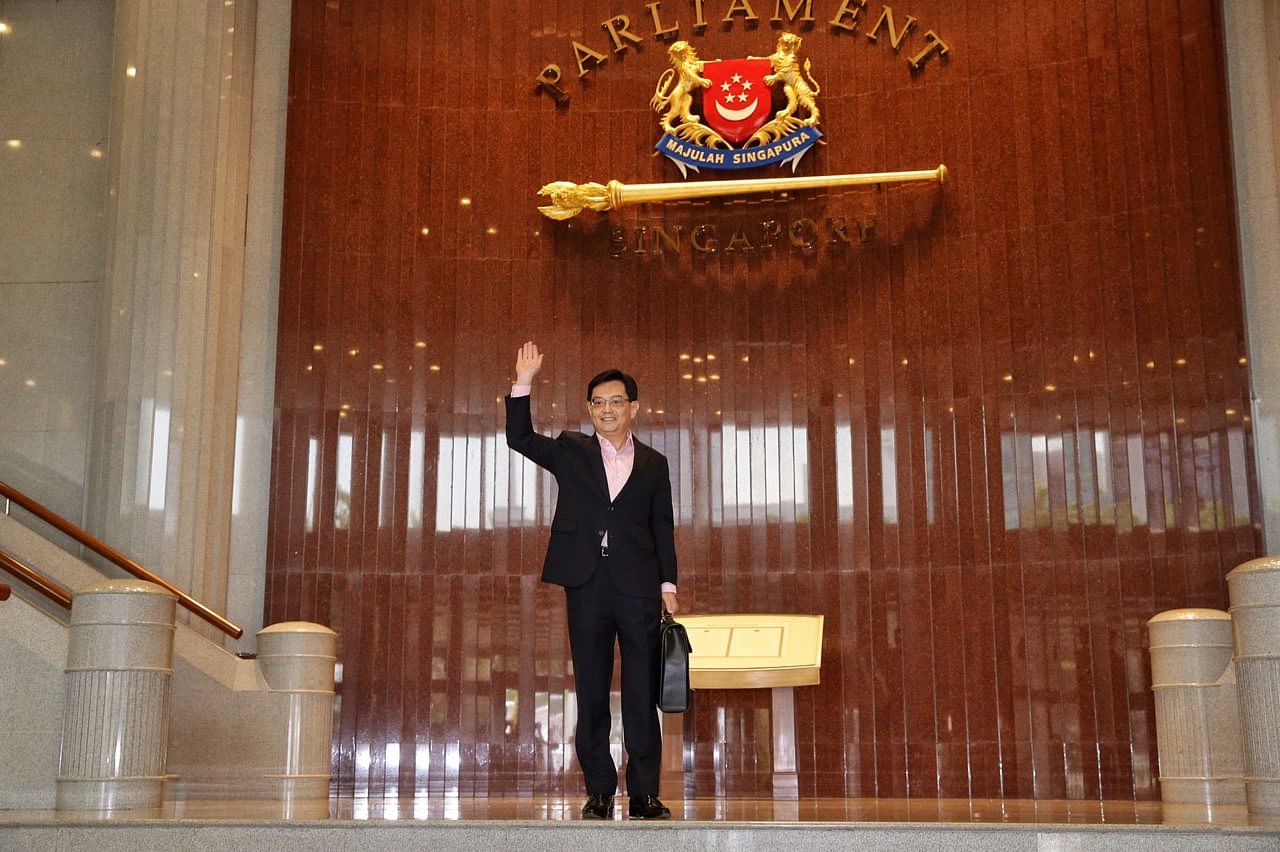Singapore Budget 2019: 30 per cent of total spending set aside for defence, security and diplomacy efforts
Sign up now: Get ST's newsletters delivered to your inbox

Finance Minister Heng Swee Keat said the Government will invest more, if the need arises, to protect Singapore's sovereignty and Singaporeans' well-being.
ST PHOTO: KEVIN LIM
SINGAPORE - About 30 per cent of the Government's total expenditure this year is being set aside to support defence, security and diplomacy efforts, which is "a significant but indispensable spending", said Finance Minister Heng Swee Keat.
As he outlined plans in these areas in his Budget speech on Monday (Feb 18), Mr Heng said the Government will invest more, if the need arises, to protect Singapore's sovereignty and Singaporeans' well-being.
He said: "Everyone has a role to play to keep Singapore safe and secure. Let us continue to stay united in defending our home and way of life."
Defence and security issues took up a greater focus of this year's Budget compared to previous years, with Mr Heng speaking on them at the start of his speech.
Noting that a safe and secure Singapore will "give us the confidence to chart an independent course", he said Singapore cannot take its peace, prosperity and stability for granted, as it remains vulnerable to regional and global fluctuations.
Also, Singapore cannot waver in its commitment to defence and security - with diplomacy and deterrence as twin pillars of its approach - against an increasingly uncertain geopolitical environment.
Besides building good relations with neighbouring countries and major powers through the Ministry of Foreign Affairs (MFA), Mr Heng also noted how the Singapore Armed Forces (SAF) lends weight to diplomatic efforts and ensures that negotiations with Singapore are taken seriously.
"Should diplomacy fail, we must stand ready to safeguard our interests, and defend ourselves," said Mr Heng, adding that Home Team agencies as well as the Cyber Security Agency of Singapore also ensure a safe environment and secure cyberspace for all.
He said the SAF remains a bulwark against threats to Singapore's way of life, as security threats are evolving and becoming more complex, even though Singapore is one of the world's safest cities with consistently low crime rates.
Mr Heng cited how the threat of terrorism remains high, with Singapore continuing to detect individuals here who have been radicalised as it sees a global rise in attacks globally by radicalised individuals and cells.
In addition, the threat of malicious cyber activities is also growing, and enhanced connectivity can be exploited to disrupt and divide society through cyber attacks, as well as the spread of falsehoods and other means, Mr Heng said.
"In particular, foreign actors will try to influence our domestic affairs and politics. This is not new, but new technologies have made it easier for others to mount attacks with greater ease and intensity, and with more sophisticated tactics," he added.
To stay ahead of these threats, Mr Heng said Singapore must continue to innovate and build new capacities to meet security needs.
In that same vein, the Home Team Science and Technology Agency will be set up by the Ministry of Home Affairs (MHA) by the end of this year, to develop science and technology capabilities and support the ministry's operational needs.
"These capabilities will strengthen the Home Team's ability to carry out its mission of safeguarding Singapore," said Mr Heng, adding that more details will be given by the Home Affairs Minister during the debate on each ministry's budget.
The private security industry has also been boosting efforts in this aspect, said Mr Heng citing how private security firm Certis Cisco redesigned its business processes and uses technology like Big Data and artificial intelligence to deal with security threats.
The MHA will also help the private security industry innovate and use technology to meet growing needs and be an effective partner to the Home Team, he added.
But every Singaporean needs to play a part too in keeping Singapore safe and secure, through the Total Defence approach, said Mr Heng.
At the national level, Singapore plans long term and takes measures such as stockpiling critical supplies, diversifying sources of water supply and strengthening its food security.
He said that as a people, Singaporeans must have the "psychological and emotional resilience to face crises stoically".
"As threats get more sophisticated, Singaporeans must stay vigilant and guard against non-conventional forces that threaten to divide us," said Mr Heng.
Touching on the importance of national service (NS) and how it has helped forge a deep understanding that each Singaporean has a duty to defend the nation, he urged families and employers to support national servicemen in every way possible.
In recognising the importance of guarding against cyber threats, a sixth pillar of digital defence was incorporated to Singapore's Total Defence framework, said Mr Heng.
The new addition to the existing five pillars of military, civil, economic, social and psychological defence was launched last week by Communications and Information Minister S. Iswaran, who is also the Minister-in-charge of Cyber Security.
Said Mr Heng: "Like other pillars of Total Defence, digital defence involves everyone - individuals, community groups, businesses and the Government.
"We must all play our part to be secure, alert and responsible online, be it through practising good cyber hygiene, being vigilant against fake news, and helping one another use technology safely."


